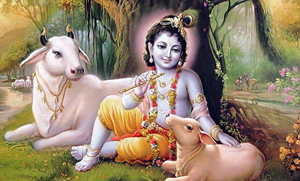Chandigarh, Jul 9: After Punjab, a proposal has been made to the BJP government in Haryana to levy gau sewa tax' or 'cow cess' to generate funds for the welfare of cows in the state.
 Haryana Gau Sewa Ayog has proposed the government to levy Rs 2,100 on booking of banquet hall, 5 per cent cess on collection of entertainment tax, Re 1 per bag of foodgrain and sought 50 per cent collections of donations from state-managed temples for creation of funds for the upkeep of cows in the state.
Haryana Gau Sewa Ayog has proposed the government to levy Rs 2,100 on booking of banquet hall, 5 per cent cess on collection of entertainment tax, Re 1 per bag of foodgrain and sought 50 per cent collections of donations from state-managed temples for creation of funds for the upkeep of cows in the state.
"We have made proposals to the Haryana government for raising funds for welfare of cows in the state," Bhani Ram Mangla, Chairman, Haryana Gau Sewa Ayog said today.
"The funds so generated will be spent for the welfare of cows," he said, adding, "The proposals are under the government's consideration".
In Haryana, there are 3.20 lakh cows in gaushalas and 1.17 lakh are stray cows, he said.
In Punjab, the Local Bodies Department had already proposed 'cow cess' which included levying cess on the purchase of four wheeler, two wheeler, oil tanker, electricity consumption, AC hall of marriage palace, non-AC hall, cement bag, Indian Made Foreign Liquor and on Punjab Medium Liquor.
Mangla said the state government has decided to set up five cow shelters at Panipat, Bhiwani, Hisar, Sirsa and Yamunanagar to protect and promote "desi" cows in the state.
Under the Haryana Gauvansh Sanrakshan and Gausamvardhan Act, cow slaughter would be punishable with rigorous punishment of between three and 10 years, and a fine up to Rs one lakh, he said.
Any person who attempts to export cows for slaughter would be imprisoned for not less than three years and up to seven years. Fine ranging from Rs 30,000 to Rs 70,000 would also be imposed, Mangla added.
The state government has set up a separate police wing under the charge of an IPS officer to stop the smuggling of cows. A toll-free number has also been launched for this purpose, he said.
Haryana government is providing a subsidy of up to 50 per cent to those rearing five cows and up to 25 per cent to those rearing more than five cows, he added.











Comments
THIS ID DIGITAL INDIA FROM MODHI GOVERMENT
, FOCUS ON COW.
HOW MANY POOR PEOPLE HUNGRY WITHOUT FOOD NEED TO FEED THEM FRIST, BEFORE BUILT THE PALACE TO COW
INDIAN PEOPLE ARE NOT FOOL THIS SHOULD IMPLEMENT IN NEPAL IF STIL THIER ARE HINDHU RASTRAA......
INDIA IS BELONG TO EVERY RELIGION EVRYONE FIGHT FOR FREDDOM .... NO RSSS WAS FIGHT FOR FREEDOM ONLY NOE THEY ARE FIGHT FOR COW
Hajj Subsidy ? Bhikmange !
Instead they can sell these cows to beef exporting companies by Gujjus.
Add new comment